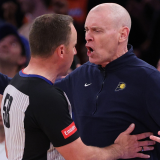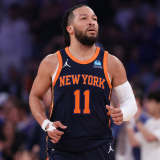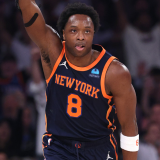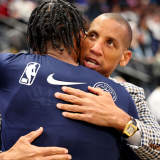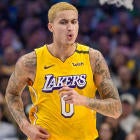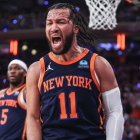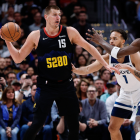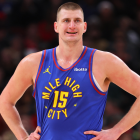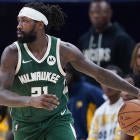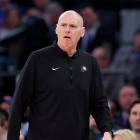Kyle Kuzma is a trade deadline survivor. Two sets of Anthony Davis negotiations couldn't pry him loose. He lasted through the great Lakers cap purge of 2018. He was drafted less than three years ago and is amazingly tied as the longest-tenured Laker with Kentavious Caldwell-Pope. In an era of unbridled roster turnover, Kuzma has remained as firmly anchored to his original team as any big-market non-lottery pick in recent memory.
The difference lies in the frame. Where once Kuzma could have been a casualty of his team's superstar ambition, he is now the object of rumors centered purely around his own performance. He is not the lure for a better player, but rather, the player himself whose presence raises question marks. The Lakers listened to Kuzma offers in the past. Now, they may well be making them.
But should they? The answer is nuanced and fluid. To understand the rumors surrounding Kuzma, you must first consider not only his place on the Lakers, but the decisions that they've made that put him in that position in the first place.
Does Kuzma fit on the Lakers?
The practical answer here is sometimes. Among regular rotation players, only Rajon Rondo has a lower net rating on the team, and the Lakers destroy opponents by 8.7 points per 100 possessions when Kuzma sits. Situationally, though, he's been a part of some of the team's most important lineups.
The trio of Kuzma, LeBron James and Anthony Davis has been practically flawless, posting elite numbers on both offense and defense en route to a staggering plus-21.2 net rating, per Cleaning the Glass. Those lineups feed off of Kuzma's reputation. Perhaps his best offensive skill is attacking closeouts and punishing scrambling defenses, and having James and Davis on the floor generates plenty of chaos.
These lineups generally take great pains to surround Kuzma with shooting. The most used fivesome has paired that trio with Danny Green and Kentavious Caldwell-Pope, and that is hardly accidental. Kuzma is only a 33.5 percent shooter from behind the arc for his career, and this season, James has been his life support. He has made 37.2 percent of his wide-open 3-pointers -- the sort James regularly creates -- but that figure falls to 32.6 percent on open attempts (bad) and 16.7 on tightly-guarded ones (yikes).
It shouldn't come as a surprise, then, that lineups featuring Kuzma and no LeBron have been dreadful. They've been outscored by 11.7 points per 100 possessions as Kuzma has struggled when tasked with initiating offense. An awkward ball-handler, Kuzma's mistakes tend to stem from overthinking. The longer he dribbles, the greater the opportunity for missteps.
Mistakes like that look entirely uncharacteristic in comparison to his more graceful moments in transition. Get him the ball with a head of steam and something good is going to happen.
Crafty finishes like these are easier to come by in short bursts, when defenses aren't set and matchups are favorable. Kuzma's inability to probe a defense independently neutralizes his undeniably advanced scoring instincts. He's a reactive player, not a proactive one.
Reactive offense isn't necessarily bad offense, and Kuzma has a number of virtues that have proven quite important to the Lakers. He is one of the league's best late shot-clock players, ranking in the 76th percentile league-wide in such situations, per Synergy Sports, and as such, he leads the Lakers with six made shots with less than two seconds remaining in a quarter (effectively buzzer-beaters). Usually, a team with two All-Stars is bailed out of such situations by those All-Stars. The Lakers have relied heavily on Kuzma to be that player for them.
But in a playoff setting, when game plans are infinitely more precise, most of the reactive opportunities Kuzma thrives on can be schemed away. So much of Kuzma's success is predicated on teams treating him like a high-end shooter, but he won't have closeouts to attack if defenses sag off of him to test that shot. This doesn't necessarily preclude Kuzma from contributing at the highest levels, but it paints a more specific picture of what the Lakers need out of a third scorer. The best version of Kuzma is one that feeds off of the offense his better teammates create. The Lakers need someone who can generate such offense himself when those better teammates are unable to do so. That's a tough ask of a player who is statistically below average in both pick-and-roll and isolation settings.
The irony there is that Kuzma is at his best defensively in such situations. The sample is limited, but his size and strength have proven a genuine deterrent to Kawhi Leonard in the past.
With a simple game plan, Kuzma can be an effective pick-and-roll defender. He has the size and athleticism to fight through screens provided the defense behind him is sound.
Kuzma proved such a nuisance last season that the Raptors had to work to engineer switches to get him off of Kawhi.
This is where Kuzma excels defensively. With Brandon Ingram forced to defend guards and James needing to rest on that end of the floor, Luke Walton often gave Kuzma the task of guarding the top opposing wing scorer. He did fairly well in that task, for as important as it is, it's also relatively simple: stay in front of your man and bother his shot. Frank Vogel even unleashed him on Russell Westbrook for a half under that exact principle and it swung a game. Kuzma is long, strong and deceptively quick. He's well-suited to that task, especially against someone like Leonard, who is relatively stationary off ball.
As necessary as it was, the postponement of last Tuesday's game against the Clippers robbed the Lakers of a very important opportunity. Kuzma missed opening night, and he had played Leonard only once in his career before Christmas. The third Lakers-Clippers game would have given the Lakers a chance to evaluate Kuzma as a potential matchup against Leonard in the playoffs more closely. Now they won't get that chance before the playoffs. Green and Caldwell-Pope are too small for Kawhi. Davis is too important elsewhere. As it stands, James and Kuzma are the only two realistic matchups for him on the roster.
That creates a philosophical crisis for the Lakers. Kuzma might be their best chance at winning their most important playoff matchup, but he's an enormous weakness in most others. Plaster Kuzma to one scorer and he can be effective. Ask him to navigate a motion offense and he's going to get lost in a maze of switches and screens.
While there are benefits to playing reactively on offense, doing so defensively is impossible. Good defenders know what to expect before it happens, but Kuzma processes so slowly off of the ball defensively that opponents take advantage of him relentlessly. He is in only the 30th percentile as a spot-up defender league-wide, per Synergy Sports, largely because he loses his man so frequently thanks to off-ball motion. Sharing the court with Davis and another center a lot of the time ensures that he is almost always matched up against players equipped to punish him that. Power forwards can hide by the basket. Small forwards can't.
Leonard even managed to take advantage of these slow reactions on-ball a few times. Kuzma defended him effectively by going over screens instinctually. When he hesitated or got confused in what coverage he was running, Kawhi beat him.
Mistakes like these cost teams playoff series, and they embody the compromise Kuzma presents. His skill set is at least unique and at most critically necessary in specific matchups. He also lacks in a number of key areas that the four other players on the floor need to cover for. Fit isn't as simple as "yes" or "no." It relies on a team's priorities. Kuzma is decidedly a luxury. Do the Lakers feel confident enough in their necessities to splurge on that sort of player, at least by virtue of opportunity cost? His presence in rumors suggests not.
Why would he specifically need to be in a trade?
The Lakers have one of the least-tradable rosters in NBA history. Kuzma is the only player on the active roster under 25. The few other young players in the system are either unproven rookies (Talen Horton-Tucker) or two-way players (Kostas Antetokounmpo, Devontae Cacok).
They owe first-round picks to the Pelicans in 2021 and either 2024 or 2025, but because of the Stepien Rule (which prevents teams from trading consecutive first-round picks) and the Seven-Year Rule (which prevents teams from trading draft picks more than seven years out), they do not have a single first-round pick that they can legally trade. They also owe their next three second-round picks to other teams.
Even if teams wanted their veterans, many of them are untradable. Rajon Rondo, Kentavious Caldwell-Pope and JaVale McGee all signed one-year contracts with player options for a second season over the summer. All three originally signed with the Lakers in 2018, so they would have been slated for Early Bird Rights in 2020 free agency. A trade would negate those rights, so all three players have the right to veto any deal. When you factor in the utter absurdity of a potential James or Davis trade, five Lakers essentially have no-trade clauses.
Kuzma is obviously not one of them. He is the only thing of any value the Lakers can reasonably offer in a deal. The Lakers could choose to focus their mid-season improvement efforts on the buyout market, or pursue a simpler salary consolidation trade merely for the sake of clearing a roster spot or two, but genuine improvement comes at a price, and Kuzma is all that remains in Rob Pelinka's asset vault. Either the Lakers trade Kuzma, or they don't improve through trade at the deadline.
What are the long-term ramifications of dealing Kuzma?
Remember all of those picks the Lakers don't have? It puts them in a relatively precarious spot. They have precious few ways of adding young talent, and they have contractual control over almost none of their existing talent. The Lakers built this roster around a two-year plan. There isn't a single player on it under a guaranteed contract for the 2021-22 season. The only two players with any measure of team control are Horton-Tucker and Kuzma through restricted free agency rights.
Kuzma might not fit on this team, but that doesn't mean he won't fit on whatever the next version of the Lakers looks like. If anything, that lack of roster certainty works in Kuzma's favor. With only Davis expected to remain in Los Angeles for the long haul, Pelinka could reshape this roster with Kuzma in mind.
That is especially true from a cap perspective. By virtue of falling to No. 27 in the 2017 NBA Draft, Kuzma's 2021 cap hold is remarkably low. Keeping him on the books that summer would cost only $8.9 million regardless of the value of his (likely more expensive) next contract. Whether they are pursuing a new superstar in free agency, spending their existing cap space to retain James or building an entirely new core around Davis, having Kuzma at such a bargain makes the front office's job substantially easier.
So would having Davis under contract at any number, and while Kuzma's presence is hardly going to be the deciding factor in his long-term future, it's worth noting that he is contractually tied to the Lakers for only a few more months. While leaving the Lakers right now seems unlikely, he is represented by Rich Paul, who has advised LeBron James and a number of other clients to take short-term deals in order to maximize flexibility. Keeping Davis for the long haul probably requires having some talent on his general timeline. Kuzma is the only worthwhile young player in the building at the moment. That could change, but a bird in the hand is worth two in the bush.
Merely employing LeBron James is a declaration of intent. The Lakers are all-in on winning the 2020 championship, and as meaningful as the factors above might seem, there likely won't be any hesitation in punting them away if it means tangibly improving their immediate championship odds. The last time the Lakers acted that way, they wound up with Steve Nash and (pre-redemption) Dwight Howard. Kuzma is insurance against such a catastrophe, and such policies rarely come so cheap.
What would it take to make a Kuzma trade worthwhile?
The simple answer is "a player that provides things that the Lakers need and Kuzma does not immediately provide." Broadly, that would point to a secondary pick-and-roll ball-handler or a more complete defensive wing with a stronger track record against Leonard and his ilk.
Such players exist on the market, though Kuzma's ability to pry them loose is debatable. Marcus Morris and Bogdan Bogdanovic would be slam dunks. Neither of their teams appears, for the moment, overly enthused about the notion of adding Kuzma. Robert Covington will apparently cost two first-round picks. Kuzma might be able to net one.
There are lower-tier options on the table. Derrick Rose can score but not defend. Andre Iguodala can defend but not score. Both are old. Both have short-term contracts (though Rose is committed for next season). Both would help the Lakers right now, but arguably less so than Kuzma, while both carry far less long-term value.
Pelinka may well scoff at that notion, but it's not as though the Lakers are built to detonate in July. James is under contract for next season and Davis will likely join him. The majority of their role players will be back. The Lakers are hardly positioned to contend for a decade, but their window shouldn't close this spring either.
Therein lies the second directive of an acceptable Kuzma trade. He is their last asset, but this is not their last season of contention. An ideal trade reflects that by bringing in a player whose value is likely to hold or increase during the duration of this run just as Kuzma's is likely to.
Checking off both boxes is going to be a stretch, and while the Knicks, Kings or Timberwolves might cave, the Lakers have to assume that they won't and prepare alternative means of improving the roster beyond giving Kuzma away. A deal for its own sake does no one any good. Kuzma could be a part of a championship Lakers team. He just shouldn't stand in the way of a bigger one.








